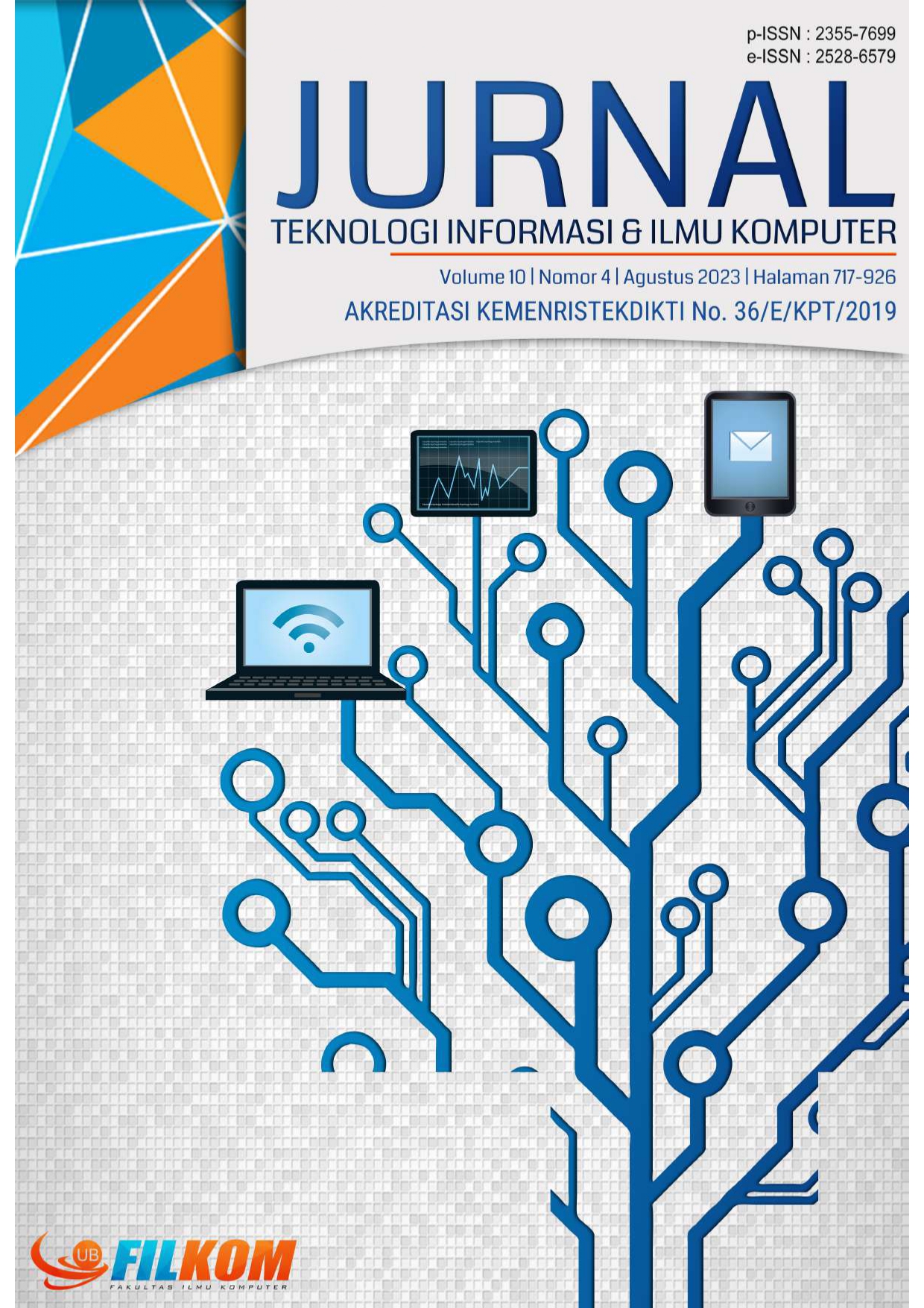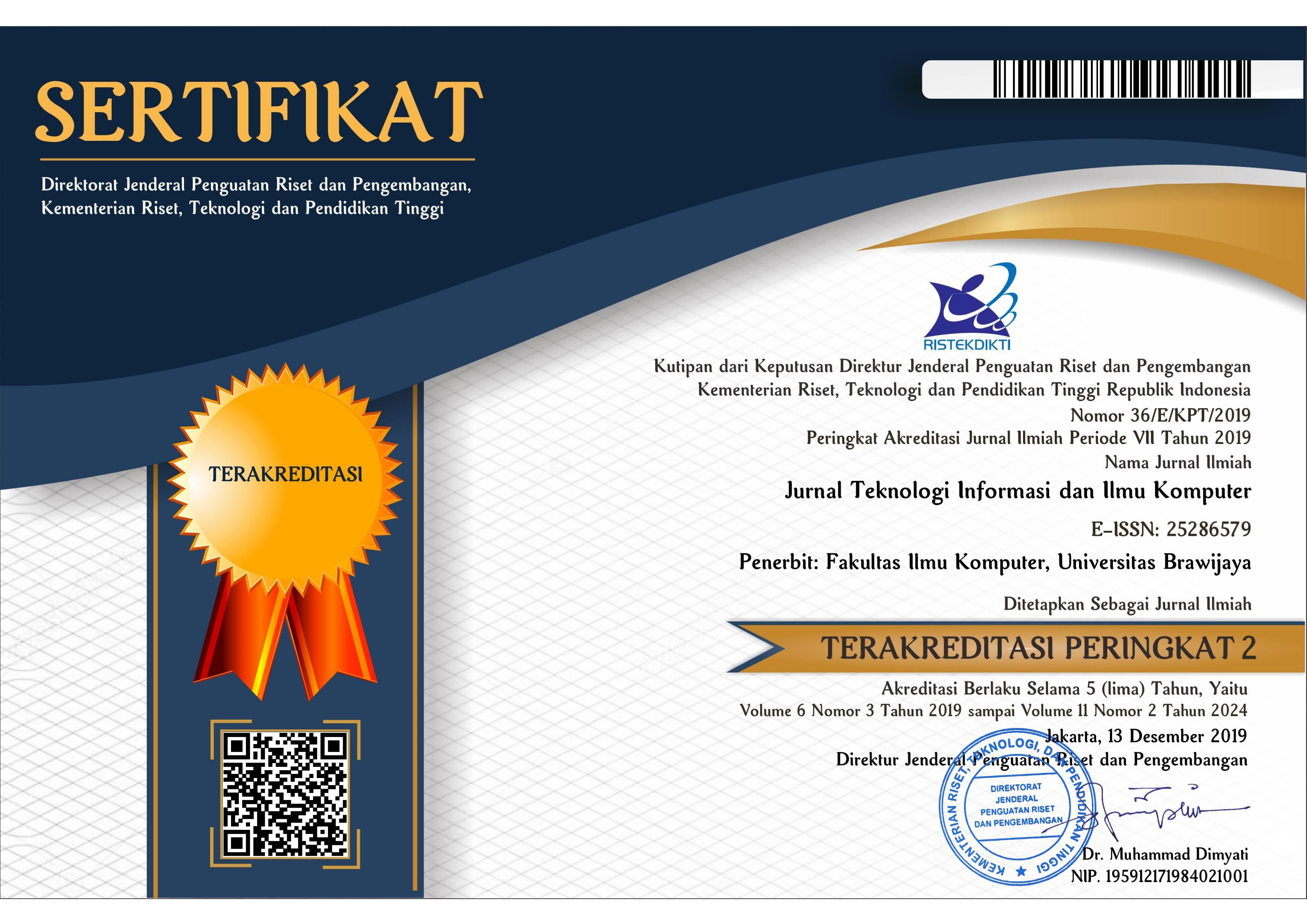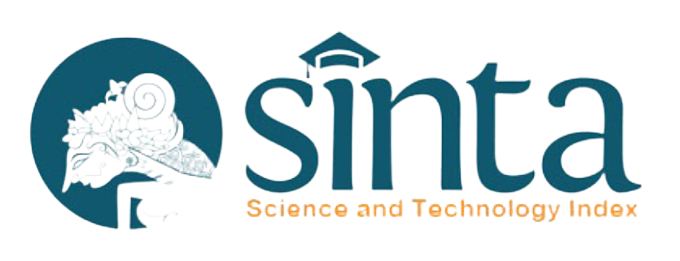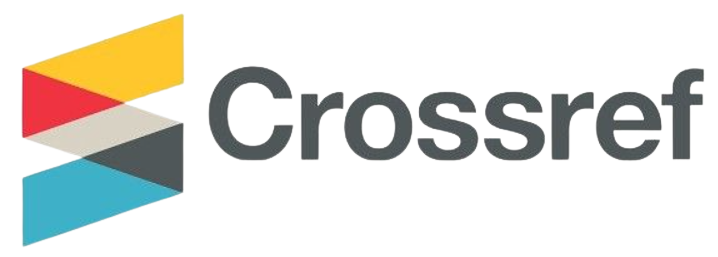Evaluasi Faktor-Faktor Pembelajaran Online pada Perguruan Tinggi Menggunakan Analytic Hierarchy Process (AHP): Studi Kasus Politeknik Elektronika Negeri Surabaya (PENS)
DOI:
https://doi.org/10.25126/jtiik.2023106860Abstrak
Pandemi Covid-19 dan lockdown telah memaksa dunia pendidikan untuk bergerak secara online. Perubahan yang telah terjadi akibat pandemi covid-19 yang telah terjadi sementara sekitar dua tahun di perguruan tinggi, diperkirakan tidak bersifat sementara dan bahkan akan berlanjut. Standar evaluasi pembelajaran tatap muka tradisional tidak dapat diterapkan begitu saja pada pembelajaran online, di perlukan penyesuaian khusus untuk kondisi kelas online. Pada penelitian ini dilakukan pandangan dan pengkajian yang komprehensif terhadap 3 faktor utama dalam penyelenggaraan perkuliahan online di perguruan tinggi meliputi faktor dosen, siswa, dan Learning Management System (LMS). Penelitian dilakukan dengan studi kasus Politeknik Elektronika Negeri Surabaya (PENS) dari sudut pandang dosen dan mahasiswa. Evaluasi faktor-faktor tersebut dilakukan dengan menggunakan AHP untuk pemeringkatan dan mendapatkan nilai kepentingan relatif. Dari perhitungan AHP yang telah dilakukan, diperoleh 10 faktor dengan penilaian tertinggi baik dari responden dosen maupun mahasiswa. Dari 10 faktor tersebut diperoleh 5 faktor yang beririsan antara dosen dan mahasiswa. Kesimpulan yang diperoleh dari penelitian ini dapat digunakan sebagai bahan evaluasi faktor-faktor pembelajaran online di perguruan tinggi pada umumnya, dan PENS khususnya.
Abstract
The COVID-19 pandemic and lockdown have forced the world of education to move online. The changes that have taken place as a result of the COVID-19 pandemic, which has occurred for about two years in college, are not expected to be temporary and will even continue. Traditional face-to-face learning evaluation standards cannot simply be applied to online learning; special adjustments are needed for online class conditions. A comprehensive view and assessment of the three main factors in the implementation of online lectures in tertiary institutions, including lecturers, students, and the Learning Management System (LMS), were carried out in this study. The research was conducted using PENS case studies from the perspective of lecturers and students. These factors are ranked and their relative importance values are calculated using AHP. From the AHP calculations that have been carried out, 10 factors with the highest ratings were obtained from both lecturer and student respondents. From these 10 factors, 5 factors were obtained that intersected between lecturers and students. The findings of this study can be used to evaluate the factors of online learning in tertiary institutions in general, and PENS in particular.
Downloads
Referensi
AL-KUMAIM, N.H., ALHAZMI, A.K., MOHAMMED, F., GAZEM, N.A., SHABBIR, M.S., FAZEA, Y., 2021. Exploring the Impact of the COVID-19 Pandemic on University Students’ Learning Life: An Integrated Conceptual Motivational Model for Sustainable and Healthy Online Learning. Sustainability 13, 2546. https://doi.org/10.3390/su13052546
ALLEN, J., ROWAN, L., SINGH, P., 2020. Teaching and teacher education in the time of COVID-19. Asia-Pacific Journal of Teacher Education 48, 233–236. https://doi.org/10.1080/1359866X.2020.1752051
ALMAIAH, M.A., AL-KHASAWNEH, A., ALTHUNIBAT, A., 2020. Exploring the critical challenges and factors influencing the E-learning system usage during COVID-19 pandemic. Educ Inf Technol 25, 5261–5280. https://doi.org/10.1007/s10639-020-10219-y
ALOMYAN, H., 2021. The Impact of Distance Learning on the Psychology and Learning of University Students during the COVID-19 Pandemic. International Journal of Instruction 14, 585–606.
ARBAUGH, J.B., 2001. How Instructor Immediacy Behaviors Affect Student Satisfaction and Learning in Web-Based Courses. Business Communication Quarterly - Bus Comm Q 64, 42–54. https://doi.org/10.1177/108056990106400405
BANERJEE, M., Brinckerhoff, L.C., 2002. Assessing Student Performance in Distance Education Courses: Implications for Testing Accommodations for Students with Learning Disabilities. Assessment for Effective Intervention 27, 25–35. https://doi.org/10.1177/073724770202700303
CAENA, F., REDECKER, C., 2019. Aligning teacher competence frameworks to 21st century challenges: The case for the European Digital Competence Framework for Educators (Digcompedu). European Journal of Education 54, 356–369. https://doi.org/10.1111/ejed.12345
CARTER JR, R.A., RICE, M., YANG, S., JACKSON, H.A., 2020. Self-regulated learning in online learning environments: strategies for remote learning, in: Information and Learning Sciences. pp. 321–329. https://doi.org/10.1108/ILS-04-2020-0114
CHENG, Y., 2012. Effects of quality antecedents on e‐learning acceptance. Internet Research 22, 361–390. https://doi.org/10.1108/10662241211235699
CHENG, Y.-M., 2011. Antecedents and consequences of e-learning acceptance. Information Systems Journal 21, 269–299. https://doi.org/10.1111/j.1365-2575.2010.00356.x
CHO, Y.Y., WOO, H., 2022. Factors in Evaluating Online Learning in Higher Education in the Era of a New Normal Derived from an Analytic Hierarchy Process (AHP) Based Survey in South Korea. Sustainability 14, 3066. https://doi.org/10.3390/su14053066
COSTLEY, J., LANGE, C., 2016. The Effects of Instructor Control of Online Learning Environments on Satisfaction and Perceived Learning. Electronic Journal of e-Learning.
CRANFIELD, D., TICK, A., VENTER, I.M., BLIGNAUT, R.J., RENAUD, K., 2021. Higher education students’ perceptions of online learning during Covid-19—a comparative study. Education Sciences 11. https://doi.org/10.3390/educsci11080403
DWI SUSANTO, QURANI, N.R., M. UDIN HARUN AL RASYID, 2021. Develop a User Behavior Analysis Tool in ETHOL Learning Management System. emitter 9, 31–44. https://doi.org/10.24003/emitter.v9i1.570
EVERETT, D.R., 2015. Adding Value: Online Student Engagement.
FALLON, C., BROWN, S., 2002. : A Guide to Purchasing, Developing, and Deploying Standards-Conformant E-Learning. CRC Press, Boca Raton. https://doi.org/10.1201/9781420025330
GEORGE, M.L., 2020. Effective Teaching and Examination Strategies for Undergraduate Learning During COVID-19 School Restrictions. Journal of Educational Technology Systems 49, 23–48. https://doi.org/10.1177/0047239520934017
GHAZAL, S., ALDOWAH, H., UMAR, I., 2018. Critical Factors to Learning Management System Acceptance and Satisfaction in a Blended Learning Environment, in: Saeed, F., Gazem, N., Patnaik, S., Saed Balaid, A.S., Mohammed, F. (Eds.), Lecture Notes on Data Engineering and Communications Technologies. Springer International Publishing, Cham, pp. 688–698. https://doi.org/10.1007/978-3-319-59427-9_71
HONG, K., LAI, K., HOLTON, D., 2003. Students’ Satisfaction and Perceived Learning with a Web-based Course. J. Educ. Technol. Soc.
ISMAIL, A., IRWAN, A., 2021. Dampak Pandemi Covid-19 Pada Manajemen Pendidikan Tinggi. Nas Media Pustaka.
KARKAR ESPERAT, T., 2018. International Graduate Students’ Challenges and Learning Experiences in Online Classes. Journal of International Students 8, 1722–1735. https://doi.org/10.5281/zenodo.1468076
LEE, H.-J., RHA, I., 2009. Influence of Structure and Interaction on Student Achievement and Satisfaction in Web-Based Distance Learning. Journal of Educational Technology & Society 12, 372–382.
LEE, S.J., HUANG, K., 2018. Online interactions and social presence in online learning 29, 113–128.
LIAW, S.-S., 2008. Investigating students’ perceived satisfaction, behavioral intention, and effectiveness of e-learning: A case study of the Blackboard system. Computers & Education 51, 864–873. https://doi.org/10.1016/j.compedu.2007.09.005
MAKOVEC, D., 2018. The teacher’s role and professional development. IJCRSEE 6, 33–45. https://doi.org/10.5937/ijcrsee1802033M
NASEER, S., RAFIQUE, S., 2021. Moderating Role of Teachers’ Academic Support between Students’ Satisfaction with Online Learning and Academic Motivation in Undergraduate Students during COVID-19. Education Research International 2021, e7345579. https://doi.org/10.1155/2021/7345579
PORTUGUEZ CASTRO, M., ROSS SCHEEDE, C., GÓMEZ ZERMEÑO, M.G., 2019. The Impact of Higher Education on Entrepreneurship and the Innovation Ecosystem: A Case Study in Mexico. Sustainability 11, 5597. https://doi.org/10.3390/su11205597
RAMAYAH, T., LEE, J.W.C., 2012. System Characteristics, Satisfaction and E-Learning Usage: A Structural Equation Model (SEM). Turkish Online Journal of Educational Technology - TOJET 11, 196–206.
RASHID, A., CHATURVEDI, A., 2019. Cloud Computing Characteristics and Services: A Brief Review. INTERNATIONAL JOURNAL OF COMPUTER SCIENCES AND ENGINEERING 7, 421–426. https://doi.org/10.26438/ijcse/v7i2.421426
ROACHE, D., MUSCHETTE, D., 2020. Transitioning to Online Distance Learning in the COVID-19 Era: A Call for Skilled Leadership in Higher Education Institutions (HEIs) 48, 8.
ROCA, J.C., CHIU, C.-M., MARTÍNEZ, F.J., 2006. Understanding e-learning continuance intention: An extension of the Technology Acceptance Model. International Journal of Human-Computer Studies 64, 683–696. https://doi.org/10.1016/j.ijhcs.2006.01.003
SACKSTEIN, S., COLEMAN, E., NDOBE, T.V., SACKSTEIN, S., COLEMAN, E., NDOBE, T.V., 2019. Lecturers’ Perceptions of Learning Management Systems Within a Previously Disadvantaged University [WWW Document]. https://services.igi-global.com/resolvedoi/resolve.aspx?doi=10.4018/978-1-5225-7473-6.ch001. URL https://www.igi-global.com/gateway/chapter/www.igi-global.com/gateway/chapter/224148 (accessed 12.26.22).
SAFAPOUR, E., KERMANSHACHI, S., TANEJA, P., 2019. A Review of Nontraditional Teaching Methods: Flipped Classroom, Gamification, Case Study, Self-Learning, and Social Media. Education Sciences 9, 273. https://doi.org/10.3390/educsci9040273
ŞAHIN, M., YURDUGÜL, H., 2018. A Content Analysis Study on the Use of Analytic Hierarchy Process in Educational Studies. Eğitimde ve Psikolojide Ölçme ve Değerlendirme Dergisi 9, 376–392. https://doi.org/10.21031/epod.373784
SARI, T., NAYIR, F., 2020. Challenges in Distance Education During the (Covid-19) Pandemic Period. Qualitative Research in Education 9, 328–360. https://doi.org/10.17583/qre.2020
TAKALA, A., KORHONEN-YRJÄNHEIKKI, K., 2019. A decade of Finnish engineering education for sustainable development. IJSHE 20, 170–186. https://doi.org/10.1108/IJSHE-07-2018-0132
TANG, C.M., CHAW, L.Y., 2016. Digital Literacy: A Prerequisite for Effective Learning in a Blended Learning Environment? 14.
TANNER, J., NOSER, T., TOTARO, M., BRUNO, S., 2022. BUSINESS SCHOOL ADMINISTRATORS’ AND FACULTY PERCEPTIONS OF ONLINE LEARNING: A COMPARATIVE STUDY.
TEO, P., 2019. Teaching for the 21st century: A case for dialogic pedagogy. Learning, Culture and Social Interaction 21, 170–178. https://doi.org/10.1016/j.lcsi.2019.03.009
THERESIAWATI, SETA, H.B., HIDAYANTO, A.N., ABIDIN, Z., 2020. Variables affecting e-learning services quality in Indonesian higher education: Students’ perspectives. Journal of Information Technology Education:Research 19, 259–286. https://doi.org/10.28945/4489
VLASENKO, K., SITAK, I., KOVALENKO, D., VOLKOV, S., LOVIANOVA, I., SEMERIKOV, S., ZAHREBELNYI, S., 2020. Methodical Recommendations for the Development of Online Course Structure and Content: Proceedings of the 1st Symposium on Advances in Educational Technology 471–485. https://doi.org/10.5220/0010925300003364
YANG, Y., CORNELIUS, L.F., 2004. Students’ Perceptions towards the Quality of Online Education: A Qualitative Approach, Association for Educational Communications and Technology. Association for Educational Communications and Technology.
YIM, Y.K., 2010. Second Language Students’ Discourse Socialization in Academic Online Communities. Canadian Modern Language Review-revue Canadienne Des Langues Vivantes - CAN MOD LANG REV 67, 1–27. https://doi.org/10.3138/cmlr.67.1.001
Unduhan
Diterbitkan
Terbitan
Bagian
Lisensi

Artikel ini berlisensi Creative Common Attribution-ShareAlike 4.0 International (CC BY-SA 4.0)
Penulis yang menerbitkan di jurnal ini menyetujui ketentuan berikut:
- Penulis menyimpan hak cipta dan memberikan jurnal hak penerbitan pertama naskah secara simultan dengan lisensi di bawah Creative Common Attribution-ShareAlike 4.0 International (CC BY-SA 4.0) yang mengizinkan orang lain untuk berbagi pekerjaan dengan sebuah pernyataan kepenulisan pekerjaan dan penerbitan awal di jurnal ini.
- Penulis bisa memasukkan ke dalam penyusunan kontraktual tambahan terpisah untuk distribusi non ekslusif versi kaya terbitan jurnal (contoh: mempostingnya ke repositori institusional atau menerbitkannya dalam sebuah buku), dengan pengakuan penerbitan awalnya di jurnal ini.
- Penulis diizinkan dan didorong untuk mem-posting karya mereka online (contoh: di repositori institusional atau di website mereka) sebelum dan selama proses penyerahan, karena dapat mengarahkan ke pertukaran produktif, seperti halnya sitiran yang lebih awal dan lebih hebat dari karya yang diterbitkan. (Lihat Efek Akses Terbuka).












